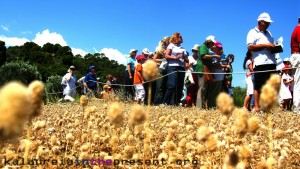A Centre for Anthropology at the University of Southampton

The field of anthropology is currently thriving internationally, and there is an increasing interest in it amongst prospective students and the wider public. Anthropologists often intervene in the contemporary debates on the major issues of the day, from the current financial crisis and the associated notions of debt and informal economies, to global migration, and to environmental matters. At the same time, there is an intense and on-going discussion on the nature and the purpose of the field, as well as its links with associated and cognate subjects. We are also seeing a rapprochement amongst related disciplines such as socio-cultural anthropology and archaeology, and a willingness to dispense with rigid disciplinary boundaries, in favor of collaborations on the basis of thematic and theoretical convergence.
The subject has been taught at Southampton for many years. Modules were offered in different departments and schools, from Archaeology to Sociology. Several anthropological modules were also offered for many years at New College, as part of the University of Southampton’s outreach programme. There are currently more than a dozen trained anthropologists at the University, and a number of others with anthropological interests, and active ethnographic-anthropological projects in many parts of the world, from South America, to India and to Greece, and other European contexts. Southampton colleagues play a major role in anthropological organisations around the world, and serve on the editorial board of international and high profile journals. But there was never a separate anthropology department. This realization prompted some of us to take the initiative and found a structure which will bring all these researchers together: The Centre for Anthropology.
This is a new, cross-Faculty, cross-disciplinary initiative, aimed at creating a space of dialogue and collaboration amongst colleagues at the University of Southampton who have active research and teaching interests in anthropology, broadly defined (socio-cultural anthropology, biological anthropology, anthropological archaeology, linguistic anthropology, visual anthropology, material culture studies). It will operate as a second intellectual home for these colleagues (and for students), in the model of North American inter-departmental Programmes and Centres.
The Centre has an informal and flexible structure, and its main activities will consist of the following:
- Organising research seminars, on a monthly basis.
- Establishing an Annual Anthropology Lecture, delivered by a senior scholar in the field.
- Coordinating informal gatherings of staff and research students, to debate research ideas, and discuss collaborative projects, cross-departmental and cross-faculty grant applications, and other initiatives.
- Liaising and collaborating with anthropological organisations such as the Royal Anthropological Institute, the Association of Social Anthropology, the European Association of Social Anthropology, the American Anthropological Association, and others.
- Exploring the possibility of new teaching initiatives and new degree schemes (UG and MA) with an anthropological focus, and addressing the increasing demand for teaching/training in ethnographic methods amongst students.
- Enhancing library resources (print and on-line) on anthropology.
- Establishing a web presence, as part of the University website.
Through these and other activities, the Centre will raise the profile of anthropology in the University and beyond, facilitate its further growth, support the teaching of Anthropology programmes and degrees (including the BSc in Sociology with Anthropology, and the new, BA in Archaeology and Anthropology which starts next year), attract PhD students with an anthropological theme, and enable their co-supervision.
In fact, given the diverse background of anthropologists and anthropologically-minded colleagues at Southampton, the Centre is a truly four-field anthropology initiative (social-cultural anthropology, archaeology, biological anthropology, linguistic anthropology), a rare, if not unique case for the UK. It also includes researchers in other fields, from ethnomusicology to medical anthropology and to archaeological ethnography. This diversity, and the informal nature of the Centre with its emphasis on collaboration and the exchange of ideas, make this initiative distinctive and highly promising. Watch this space!
If you want to be involved, please get in touch: y.hamilakis@soton.ac.uk

Leave a Reply